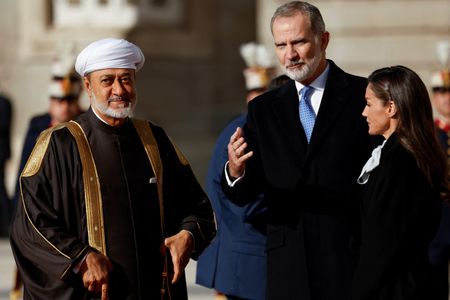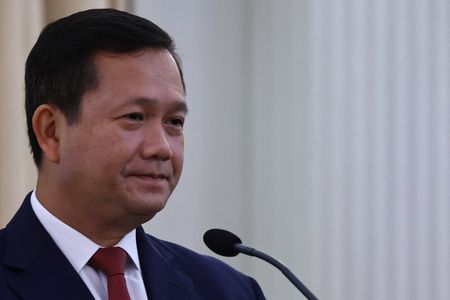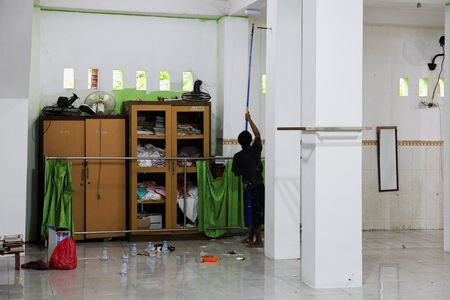By Charlie Devereux and Aislinn Laing
MADRID (Reuters) -King Felipe VI will start the first state visit to China by a Spanish monarch in 18 years on Tuesday as Madrid pursues the most active courtship of Beijing within the European Union.
The four-day trip, coinciding with the 20th anniversary of high-level bilateral relations, should further cement business and political interests with China at a time when Spain’s ties with the world’s other superpower, the U.S., are souring.
Felipe, accompanied by Foreign Minister Jose Maria Albares, Economy Minister Carlos Cuerpo and a phalanx of Spanish businesspeople, will spend Tuesday in the city of Chengdu before meetings in Beijing on Wednesday with President Xi Jinping, Premier Li Qiang and top legislator Zhao Leji.
The king’s visit follows three trips by Socialist Prime Minister Pedro Sanchez in as many years in a strategy by Madrid to rebalance trade relations skewed in favour of Beijing.
Spain imported 45 billion euros ($52.5 billion) of goods from China in 2024 while it exported just 7.5 billion euros, according to state trade agency ICEX.
China has reciprocated the courtship.
In December, Madrid hosted the first overseas edition of the Imperial Springs International Forum (ISIF) – a Chinese equivalent of the Davos World Economic Forum or Allen & Company’s Sun Valley Conference.
That was seen by China-watchers as a reflection of China’s growing confidence in its new best friend in Europe, where other nations are cautious about engagement given trade imbalances, Beijing’s relations with Russia and its dominance of critical minerals’ supply.
Xi made a state visit to Spain in November 2018, at the start of Sanchez’s time in office.
Spanish pork exporters say closer ties have helped boost sales. Pork exports to China rose 8% to 700 million euros ($780 million) in January-July from a year earlier, even as exports from Denmark and the Netherlands fell and U.S. shipments also declined, data by ICEX show.
Spain sent about half of the 682,000 tonnes of pork sold to China during that period, according to the Spanish association of meat industries, Anice.
Spain has a product China wants but the pork trade is also “now shaped by a series of geostrategic and geopolitical factors,” Grupo Tello Alimentacion export director Javier Briones told Reuters.
“We are in China’s hands… but we couldn’t ask for a better ambassador than the king of Spain to defend our interests.”
TANGIBLE BENEFITS OF WARMER TIES
The warming relationship is not only helping pork exports.
Chinese businesses such as CATL, Envision and Chery are investing in EV battery factories and car plants. Envision and Hygreen have pledged to open electrolyser manufacturing plants while three Chinese energy firms have signed deals to invest in a potassium mine in northeastern Spain.
Spain is also thought to be a frontrunner to host the Chinese carmaker BYD’s third European plant, as the firm quadrupled its dealership network there without the competition of a strong local carmaker, analysts said.
The presidents of Spain’s regional powerhouses Catalonia and Andalucia have made their own visits to China in the past year.
The left-wing Spanish government’s closer relations with China are a tactical hedge against souring relations with the U.S., Bruegel Senior Fellow Alicia Garcia-Herrero told Reuters.
President Donald Trump has threatened to apply sanctions to Spain for its failure to meet NATO spending targets and differences over Gaza.
“China could provide an alternative in terms of greenfield and other investment,” she said. “It made sense on the investment side but it’s very political, it’s Spain betting no on Trump.”
Questions remain, however, about the potential use of Huawei technology by Spanish ministries to handle sensitive data. One project, between the digital transformation ministry and Telefonica to strengthen fibre optic networks using Huawei technology, was cancelled earlier this year over security concerns.
U.S. politicians in July called on Director of National Intelligence Tulsi Gabbard to limit intelligence sharing with Spain after it renewed a contract with Huawei to use its storage servers for its judicial wiretapping system.
The contract “can potentially create a dependency on a high-risk supplier in a critical and sensitive sector that would increase the risk of foreign interference,” EU tech commissioner Henna Virkkunen said in a written response to an EU lawmaker’s question.
($1 = 0.8575 euros)
(Reporting by Aislinn Laing and Charlie Devereux, additional reporting by Joan Faus and Corina Pons; Editing by Andrew Cawthorne)









